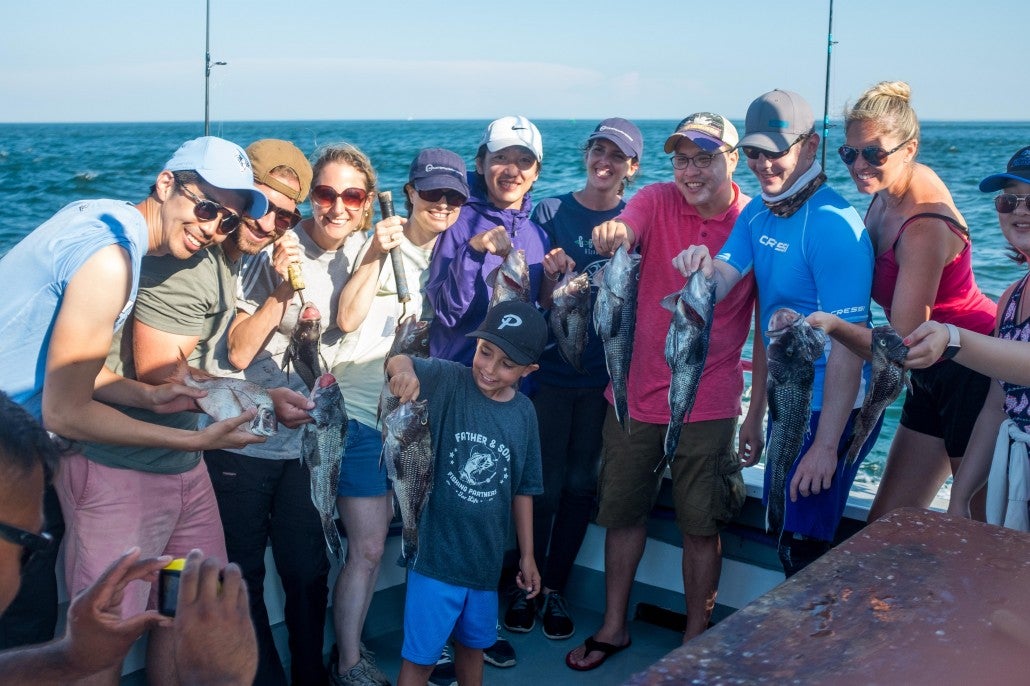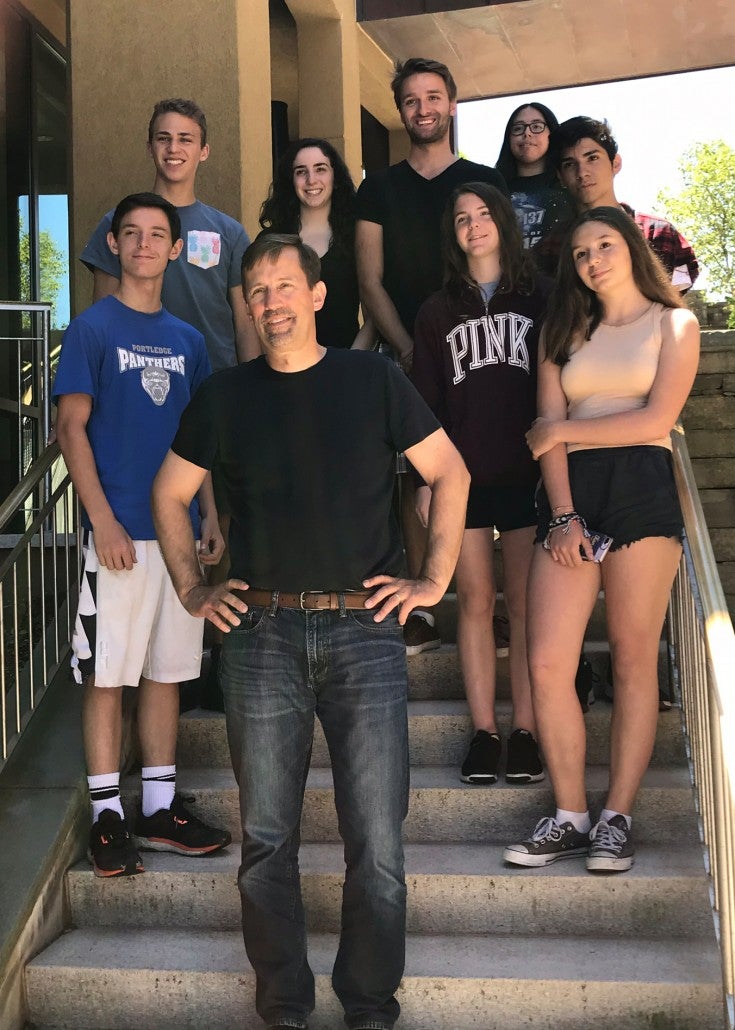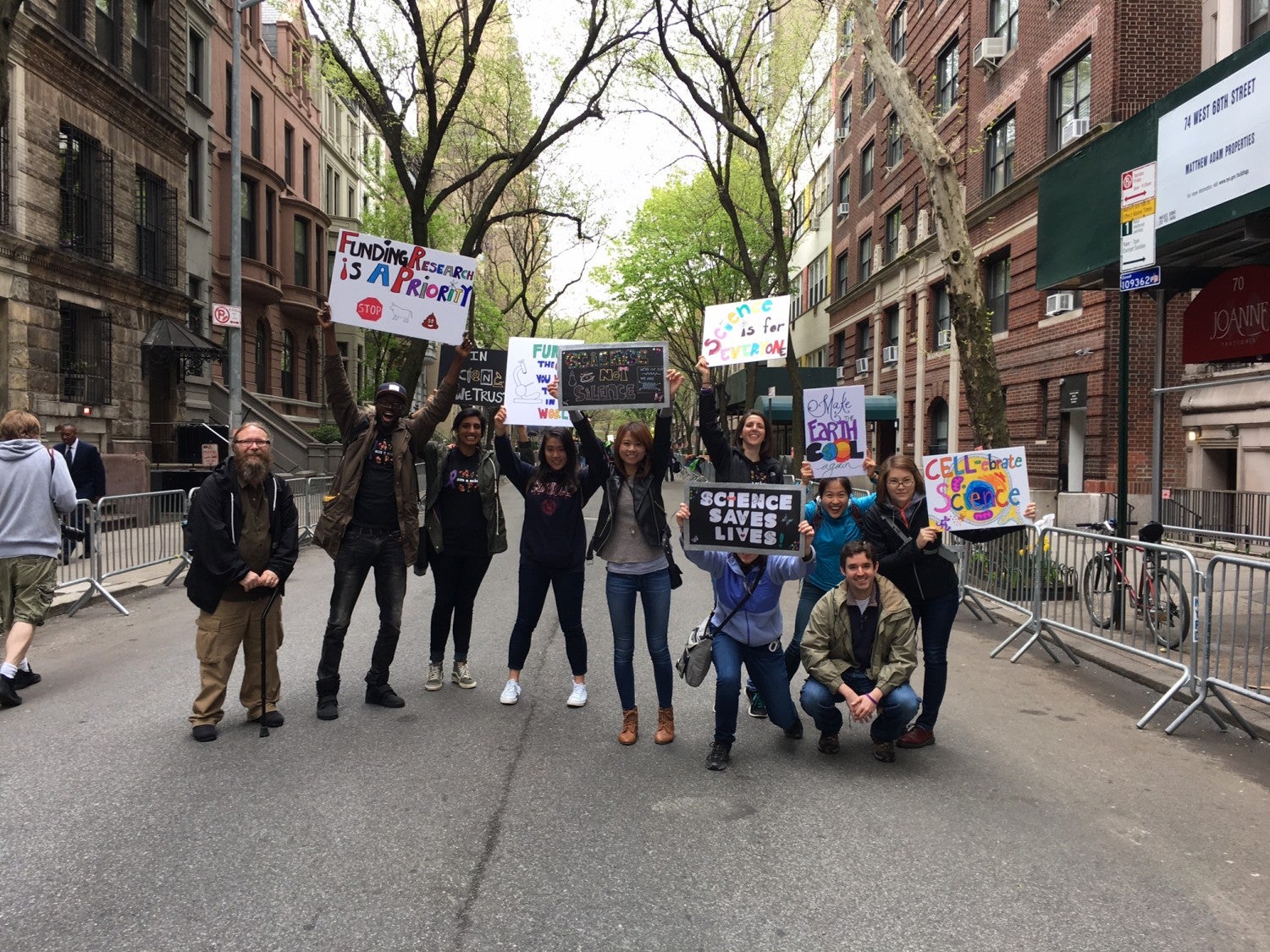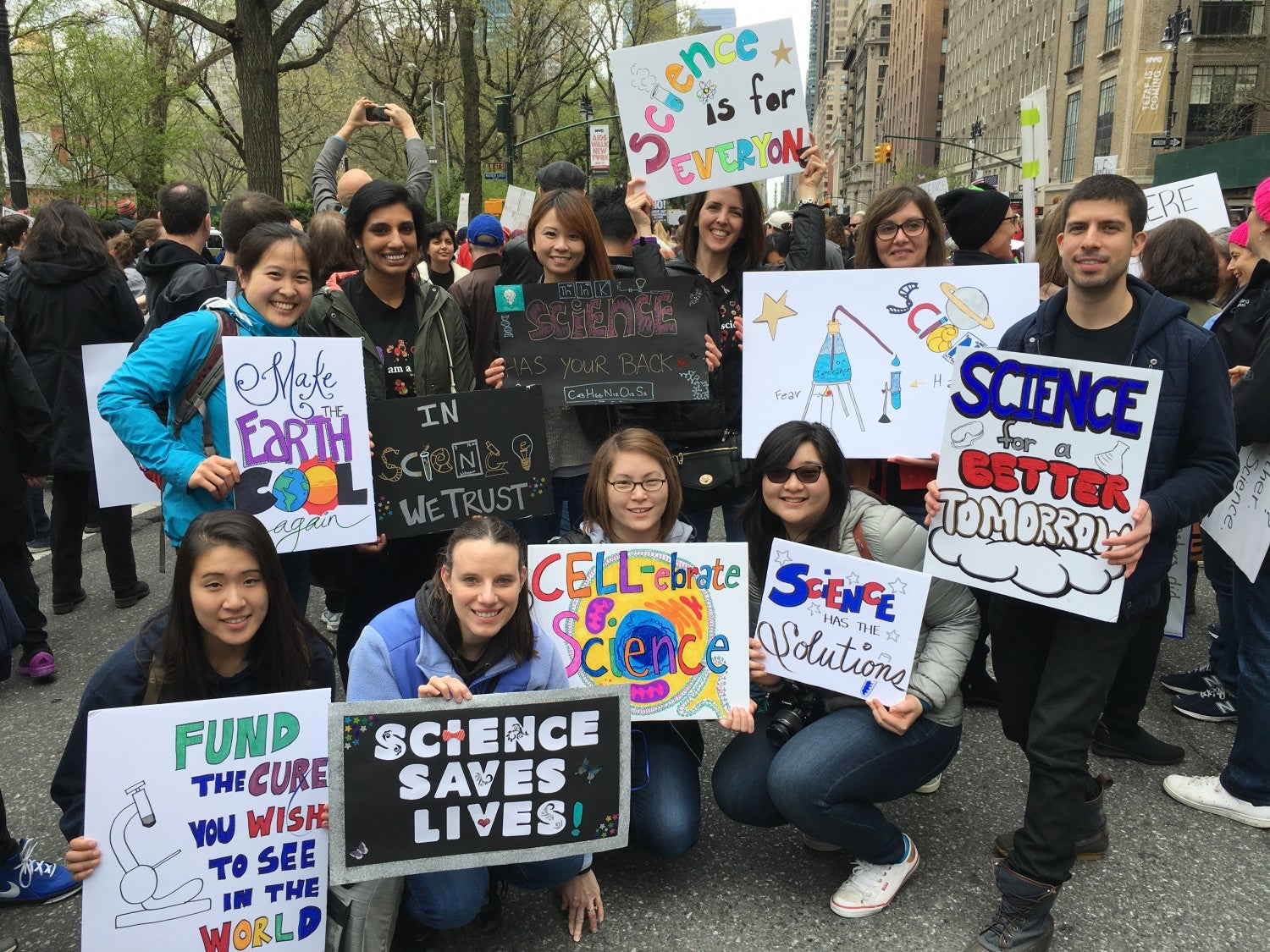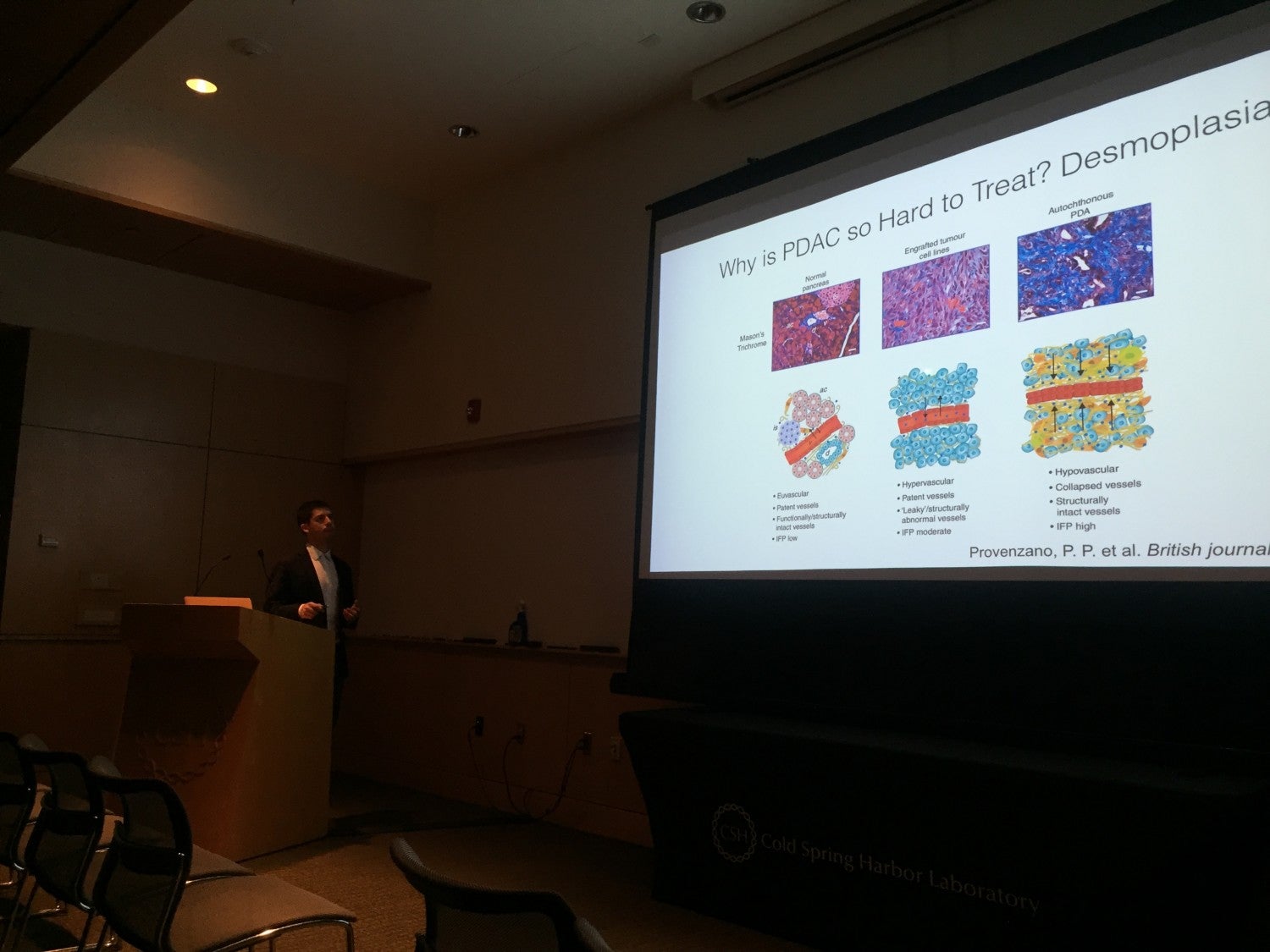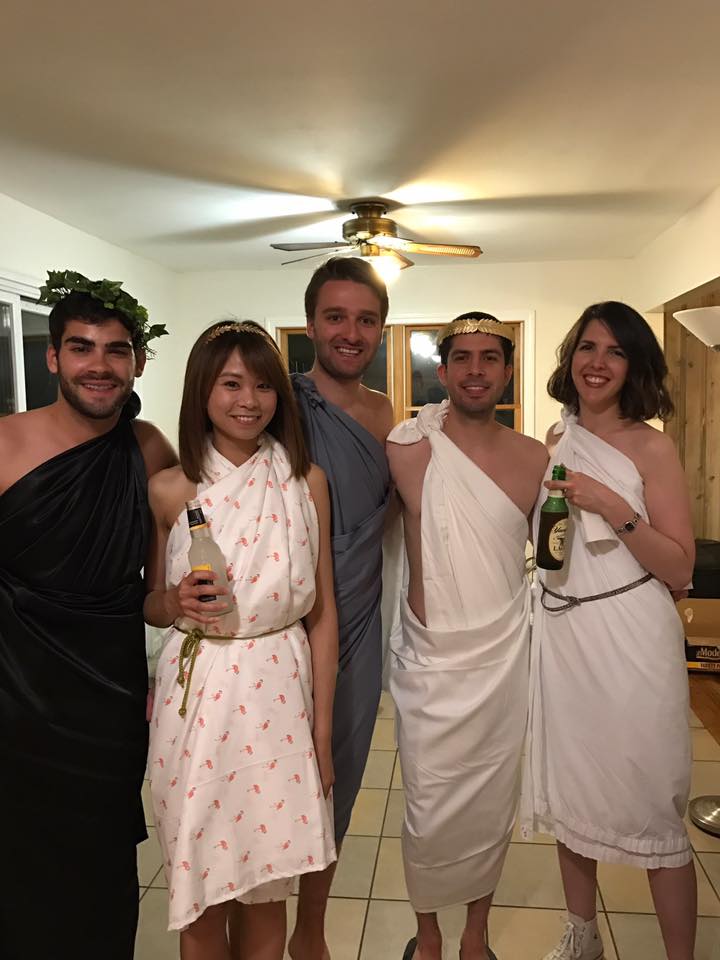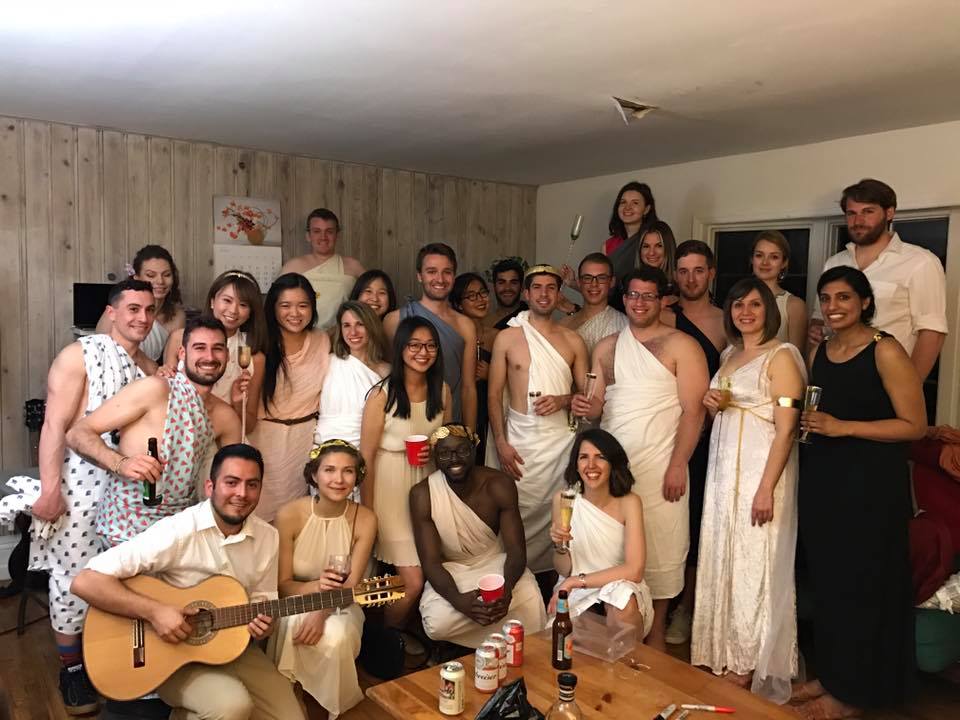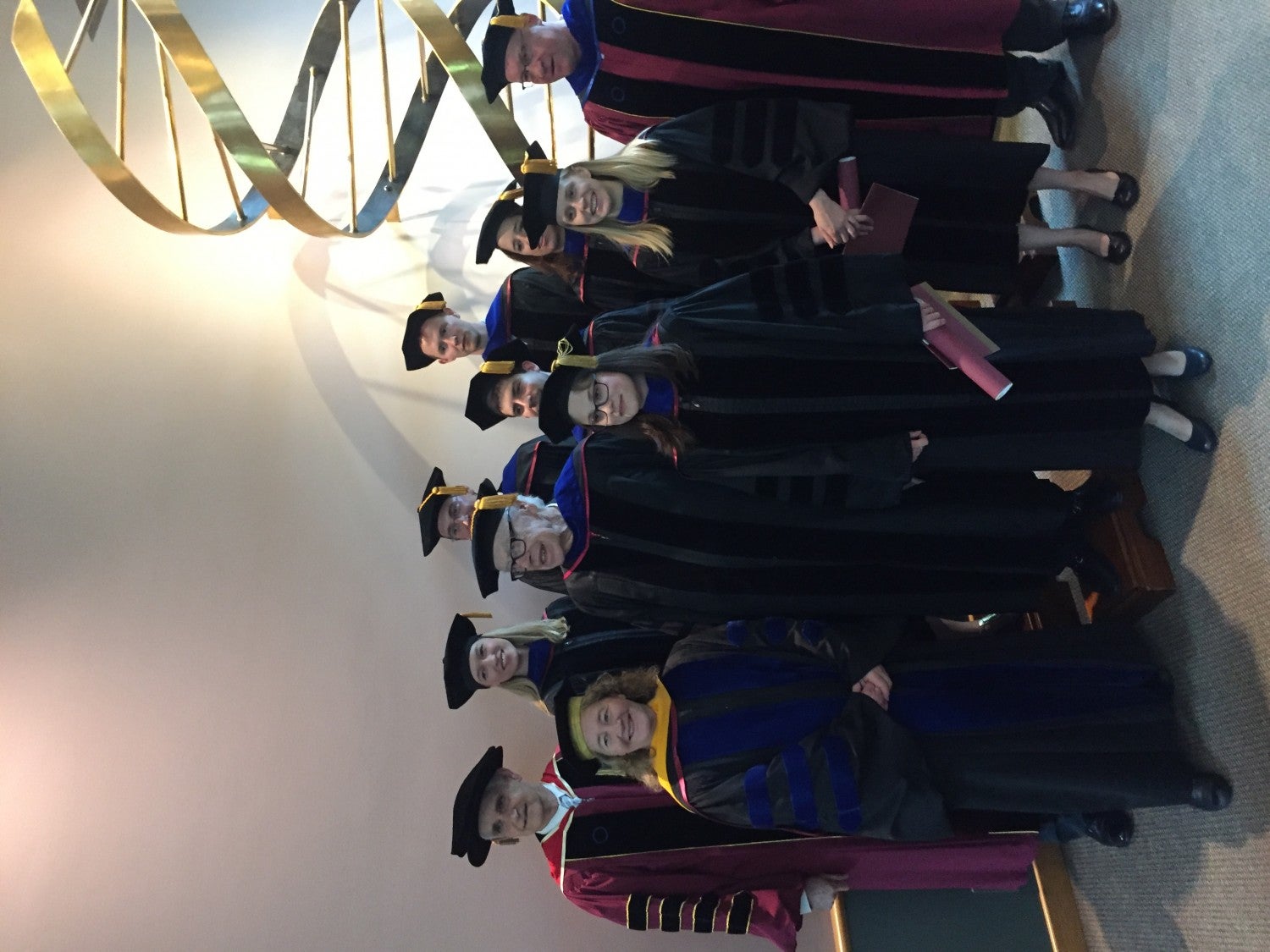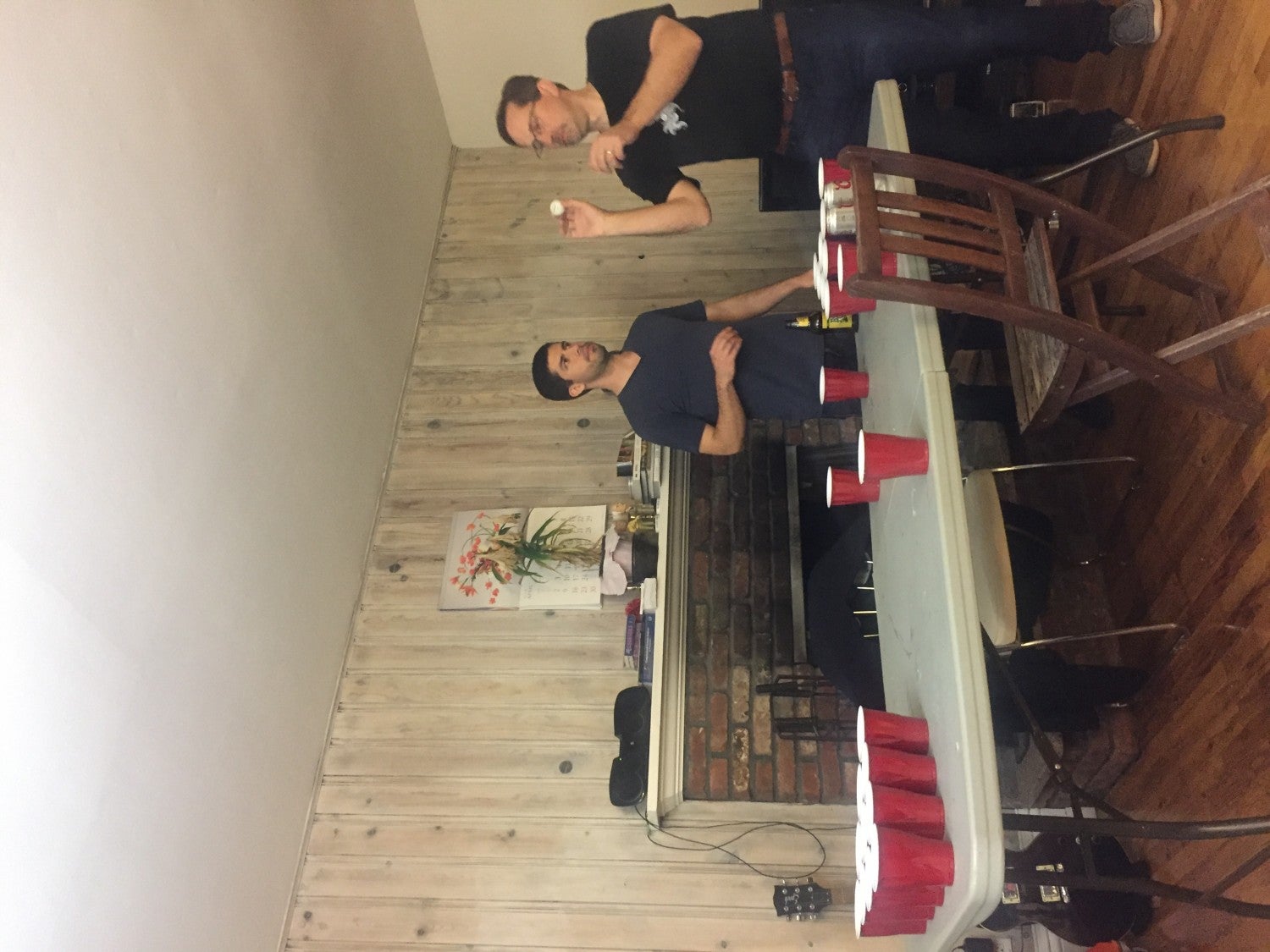Tuveson Lab Walks for a Cure!
October 3, 2021
Today, members of the Tuveson Lab participated in the Lustgarten Foundation Long Island Pancreatic Cancer Research Walk, which raises funds to support pancreatic cancer research. The lab team raised more than $1,600 in funding for the walk. In addition to walking, lab members staffed an information booth, where they answered questions about pancreatic cancer and the research going on in the lab.
Congrats to Young on Her Successful R50 Renewal!
September 21, 2021
Congratulations to Tuveson Lab member Young Park who received notice that her NCI R50 award, “Preclinical Models for Cancer Therapeutic Development,” has been renewed! With this support, Young is developing more effective and novel mouse models of pancreatic cancer that will enable researchers to study targetable genes and pathways involved in this disease. Her models will also be used to elucidate the identities and functions of diverse cell types observed in pancreatic tumors. She will use these findings to design novel therapeutic strategies to eradicate both cancer cells and tumor-promoting non-cancerous fibroblasts simultaneously.
Summer Celebration of New Beginnings
August 4, 2021
Members of the Tuveson Lab gathered today in a three-part celebration. First, the lab showered expectant mother Jen Thalappillil. Second, the lab celebrated the recent birth of a beautiful baby girl to Dennis and Julianne Plenker, and finally, the lab celebrated Dennis for obtaining a new position in industry. The lab was blown away by Jessica Peluso’s lightning-fast diapering skills, and many laughs were chuckled as lab members tried to guess the flavors present in different baby foods through blind taste tests.
Summer Volleyball is in Full Swing
July 19, 2021
A beloved Cold Spring Harbor Laboratory annual summer tradition has returned to campus this year – the summer volleyball tournament. This year, members of the Tuveson Lab have gotten together with members from the Vakoc Lab to put together a team. Led by Captain Ken Addison, the team competes against other campus teams in weekly matches and gets together to volley the ball around for fun on other days.
Congrats to Derek and Tobi on their recent paper!
May 25, 2021
Congrats to former Tuveson Lab grad students Derek Cheng and Tobiloba Oni, and to other Tuveson Lab members on the recent publication of their paper in Proceedings of the National Academy of Sciences of the United States of America! The team worked to better understand the functions KRAS, a gene mutated in almost all cases of pancreatic ductal adenocarcinoma. They used an approach called “proximity labeling” to identify proteins that are located close to and likely partner with KRAS. Through this approach, they identified proteins that interact specifically with the mutant form of KRAS, including RSK1. RSK1 is part of the RSK family of serine/threonine kinases, and is known to be activated by ERK signaling downstream of EGFR and RAS activation. Through additional experiments, the team demonstrated that NF1 and SPRED2, two known negative regulators of RAS, are required for RSK1 to interact with mutant KRAS. The team further found that RSK1 blocks signaling from the non-mutated form of KRAS. Importantly, this negative regulation is lost when mutant KRAS is blocked with mutant-specific therapies, disinhibiting the non-mutant RAS. This provides a mechanism through which cancer cells can escape therapies directed at the mutant RAS. The development of combination strategies to target both mutant and wild-type RAS will be important to ensure the efficacy of RAS-directed therapies.
See the recent CSHL press release for more information.
CONGRATS TO DAVE ON BECOMING AACR PRESIDENT!
April 12, 2021
Congratulations to Dave Tuveson, who assumed the role of AACR President at the AACR Business Meeting this evening. Dave takes over for former President Antoni Ribas.
THE LAB WISHES TOBI THE BEST IN HIS NEW FELLOW POSITION
February 10, 2021
The Tuveson Lab held our farewell for Grad Student Tobiloba Oni today. As part of the farewell, Dave and Tobi engaged in a snowball showdown. Tobi leaves us to take a fellow position at the Whitehead Institute. We are excited to follow the exciting science coming out of the Oni Lab. Tobi’s jokes and enthusiasm will be greatly missed in the lab.
RESEARCH ZOOMS AHEAD IN THE TUVESON LAB!
November 25, 2020
The ongoing COVID-19 pandemic has changed a lot in the Tuveson Lab. Nonetheless, lab members are all still working diligently to make new discoveries into the biology of pancreatic cancer. One big change has been the shift to Zoom meetings. Today, lab members gathered by Zoom to discuss the latest research updates. As one benefit of the shift to Zoom meetings, new lab members Amber Habowski and Jon Kastan are able to take part in our lab meetings before they have officially joined us.
Congratulations to Tobi and Giulia on their new paper!
July 7, 2020
Congratulations to Tuveson Lab grad student Tobi Oni and former Tuveson postdoc Giulia Biffi on the publication of their new paper in the Journal of Experimental Medicine! Tobi, Giulia, and team collaborated to examine how pancreatic cancer cells metabolize cholesterol and discovered that the genes involved in cholesterol biosynthesis are increased in cancer compared to normal cells. In particular, the team found that pancreatic cancer cells increase levels of sterol O-acyltransferase 1 (SOAT1), an enzyme that converts cholesterol to an inert form inside of cells. The presence of active cholesterol typically shuts the cholesterol pathway down, so conversion of cholesterol to an inert form by SOAT1 allows the cholesterol pathway to keep working. When the team deleted SOAT1, it impaired the ability of pancreatic tumors to grow and metastasize in mouse and organoid models, demonstrating that this function is important to the cancer cells. Importantly, only cells that harbor mutations in the p53 tumor suppressor gene are reliant on this SOAT1-driven cholesterol pathway; normal pancreas cells are not bothered by SOAT1-deletion. Their work suggests that SOAT1 may be a promising therapeutic target for pancreatic cancer, and future studies will further examine whether drugs that target SOAT1 or cholesterol metabolism could be part of a new treatment strategy for this deadly cancer.
Tuveson Lab Walks for a Cure
October 6, 2019
Today, the Tuveson Lab participated in the 19th annual Long Island Pancreatic Cancer Research Walk. The walk, which is organized by the Lustgarten Foundation, helps to raise money to support pancreatic cancer research. More than 7000 people donned purple shirts and joined the walk this year, which raised more than $1 million. In addition to walking, members of the Tuveson Lab manned our information table where walk participants could come to ask questions about pancreatic cancer research.
Congratulations to Fieke on the publication of her paper!
September 16, 2019
Congratulations to Tuveson Lab Clinical Fellow Fieke Froeling on the publication of her new paper in Clinical Cancer Research! Fieke and team collaborated with Boston Biomedical, Inc. to better understand the mechanism of their anti-cancer drug napabucasin (BBI-608). The team discovered that this drug can serve as a substrate for intracellular oxidoreductases, such as NQO1. By serving as a substrate for NQO1, the drug promotes the production of oxidants, which damage DNA and prove toxic to pancreatic cancer cells. The team uncovered a network of cellular pathways affected by treatment with napabucasin (see figure below). By better understanding how napabucasin works the researchers hope to be able to rationally design therapeutic combinations involving napabucasin that are more effective at treating pancreatic cancer than current therapies.
Congrats to Young Park and Mariano Ponz-Sarvise on their recent paper!
September 9, 2019
Congratulations to Young Park, Mariano Ponz-Sarvise, and other present and former members of the Tuveson Lab on the publication of their study in Clinical Cancer Research today. Young and Mariano studied whether the MAPK and AKT pathways, activated downstream of mutant KRAS, could be inhibited together to target pancreatic cancer cells. They encountered a problem well-known to cancer researchers, which is that cancer cells find ways to circumvent the targeting of these pathways allowing them to resist therapies. By comparing non-cancerous organoids to pancreatic cancer organoids, they discovered a mechanism specifically used by the cancer cells to escape MAPK/AKT co-inhibition: the cancer cells specifically activate members of the ERBB pathway. Adding a therapy that blocks ERBB activation prevented cancer cells from using this mechanism to escape. Their results suggest that novel combination treatments that include a pan-ERBB inhibitor may be more effective for treating pancreatic cancer, provided the side effects of these combinations are tolerable.
See the recent CSHL press release for more information.
New lab technicians join the Tuveson Lab
August 23, 2019
It has been a busy couple of months in the Tuveson Laboratory, with the addition of three new lab technicians. Zachary Galluzzo joins our Human Organoid Team, where he will help to generate patient-derived organoid models of cancer and help to launch the new CSHL Organoid Shared Resource. Ashley Adler and Abhishek (Abhi) Doshi join our Preclinical Team, where they will aid in our animal studies. Shown below is our Preclinical Team (from left to right: Ashley, Matt, Abhi, and Erin) working to together on a recent afternoon to get each other up to speed on our protocols and record-keeping.
Tuveson Lab Technician Melissa Yao departs to start her Master’s studies
July 26, 2019
Today, members of the Tuveson Lab bid a fond farewell to senior Tuveson Lab technician Melissa Yao. Melissa joined the lab in 2016, shortly after finishing her undergraduate studies at Stony Brook University. Melissa quickly mastered the lab’s organoid and animal protocols and was instrumental in helping to organize and teach the official CSHL Organoid Course in December 2016. She became a leader in the laboratory, helping others to get oriented, keeping the laboratory organized, and helping new lab members learn key techniques. She developed many close friendships in the lab, including with Research Investigator Young Park; the two are shown twinning below. Many members of the Tuveson Lab also benefited from Melissa’s crochet talents. Melissa leaves us to get a Master’s degree at the Icahn School of Medicine at Mount Sinai. We wish her all the best in her studies and beyond!
Congratulations to Georgi Yordanov on the successful defense of his thesis!
July 3, 2019
Congratulations to Tuveson Lab grad student Georgi Yordanov on the successful defense of his Ph.D. thesis. Georgi studied the role of two transcription factors, Myc and Spdef in promoting pancreatic cancer development. His thesis studies demonstrated that Spdef aids pancreatic cancer cells by helping to mitigate proteotoxic stress. Other members of the Tuveson Lab will now continue Georgi’s studies into the links between proteotoxic stress and pancreatic cancer. Dr. Yordanov will soon be leaving the Tuveson Lab to apply his science acumen to Wall Street, where he will take a position as an Equity Research Associate at Cowen and Company. We wish him all the best in his future endeavors!
Congrats to former Tuveson Lab member Dannie Engle on her new paper, out today in Science!
June 20, 2019
Congratulations to Dannie Engle on the publication of her postdoctoral research in Science today. Dannie studied the glycosylation mark CA19-9. This sugar is present in proteins in the bloodstream of 75% of pancreatic cancer patients, but its potential functions are poorly understood. Studying this sugar has been challenging because mice do not produce it. Dannie engineered mice to inducibly produce CA19-9. Surprisingly, turning on CA19-9 production in the mice caused pancreatitis, an inflammatory condition of the pancreas known to increase the risk of developing pancreatic cancer. Moreover, CA19-9 production worsened the pancreatic tumors and decreased the survival of a mouse model of pancreatic cancer. These effects could be reversed using an antibody that blocked the sugar. Together, Dannie’s results suggest that rather than being simply a biomarker of pancreatic cancer, CA19-9 has a direct role in promoting this aggressive disease. Prophylactic intervention to block CA19-9 in the setting of recurrent pancreatitis in patients might help to reduce the severity of pancreatitis and to prevent the development of pancreatic cancer.
See the recent CSHL press release for more information.
Congratulations to Ela on the publication of her paper!
June 13, 2019
Congratulations to Ela Elyada on the publication of her new paper in Cancer Discovery. Ela collaborated with Dr. Paul Robson, an expert in single cell approaches at Jackson Laboratory. They used single-cell RNA-sequencing to characterize cell populations present in pancreatic tumors, with a special focus on the cancer-associated fibroblasts. Excitingly, they discovered a new type of fibroblast present in pancreatic tumors, that is capable of antigen presentation.
For more information, see the CSHL press release.
The Tuveson Lab Opens Up for the CSHL Open House
June 8, 2019
Members of the Tuveson Laboratory participated in the CSHL Open House this weekend. This event brought more than 300 visitors to the CSHL Campus to learn about the research we conduct. Children and adults alike visited the Quick Building to see inside the Tuveson Lab, try multichannel pipetting, and play “histology detectives.”
The Tuveson Lab participates in Health Disparities Symposium
March 1, 2019
Members of the Tuveson Laboratory participated in a Cancer Health Disparities Symposium at SUNY Downstate today. We listened to interesting talks on cancer biology and on cancer health disparities. There was also a fantastic key note address from Alfred Lacks Carter, Jr., the grandson of Henrietta Lacks. Dennis presented the lab’s progress on our P20 project, which examines differences in pancreatic cancer biology in patients of different races.
The Tuveson Lab congratulates Ben on his last day
February 27, 2019
Today, the Tuveson Lab said goodbye to our talented technician Ben Spielman. We wish him good luck as he leaves us to pursue an M.D.-Ph.D. degree!
The Tuveson Lab commemorates World Pancreatic Cancer Day
November 15, 2018
Today, the Tuveson Lab gathered with the Lustgarten Foundation to commemorate World Pancreatic Cancer Day. This day seeks to raise awareness about pancreatic cancer and to promote progress towards curing this cancer.
Congrats to Giulia Biffi on the publication of her paper!
October 26, 2018
Dr. Biffi’s new paper is online today at Cancer Discovery! Following from the lab’s previous discovery that two different types of cancer associated fibroblasts (CAFs) co-exist in the pancreatic cancer microenvironment, Giulia sought to better understand the signaling cascades that specify each type of fibroblast’s fate. Her research has uncovered a role for IL-1 signaling in promoting the inflammatory CAF state found in stroma more distal to the cancer cells. In contrast, CAFs close to the cancer cells are exposed to cancer-secreted TGFβ which promotes downregulation of the IL-1 receptor, antagonizing IL1 signaling and promoting a myofibroblastic-CAF state. This study suggests new strategies to treat pancreatic tumors by targeting the inflammatory CAFs, which may prove more successful than treatments that target cancer cells alone.
See the recent CSHL press release for more information.
Tuveson Lab participates in research walk
October 9, 2018
Last weekend, the Tuveson Lab joined together to participate in the Lustgarten Foundation Pancreatic Cancer Research Walk. We worked together to raise money and awareness for this deadly cancer. At the walk, we also set up a research booth to talk to other walk participants about the research we do to find ways to diagnose pancreatic cancer sooner and identify better ways to target pancreas tumors.
Tuveson Lab goes fishing
August 9, 2018
Members of the Tuveson Lab put down their pipettes to go fishing today. The team went out east to Orient Point and boarded the vessel Brooklyn Girl. Sandra caught the biggest fish of the day, but many other lab members had good fishing luck, netting enough fish for a fish fry the next day.
Tuveson Lab hosts Junior Cancer Academy
July 19, 2018
Today, the first ever Tuveson Lab Junior Cancer Academy wrapped up. Six high school students joined us to learn about pancreatic cancer, basic biology, cancer research, and careers in science. Led by graduate student Georgi Yordanov, students learned to clone plasmids and perform immunohistochemical staining. Students presented their work to the lab during our weekly lab meeting. Summer undergrad Emily Ashkin also worked with Georgi to research the factors that drive expression of the transcription factor Spdef in pancreatic cancer cells. We wish our students all the best as they return to school this fall!
Best Wishes to Dr. Chang-Il Hwang and Eunjung Lee in Their New Lab!
June 29, 2018
Professor Hwang will be starting his own lab at U.C. Davis, and Eun will take a position as a Research Associate the Hwang Lab.
Stay tuned to the Hwang Lab Twitter Account for new developments!
Dr. Hervé Tiriac published his research showing organoids can be used to predict treatment response for pancreatic cancer patients
May 31, 2018
The lab’s newest paper is hot off the presses at Cancer Discovery. Hervé and other members of the Tuveson Lab generated and characterized a panel of organoid cultures from patients with pancreatic cancer. Organoids were treated with standard chemotherapies and targeted agents to determine the therapeutic response profile for each patient-derived organoid culture. By comparing drug sensitivities of the organoids to gene expression data, they were able to identify an organoid gene expression signature that predicts a response to chemotherapy.
See the recent CSHL press release for more information.
Congrats to Dr. Brinda Alagesan on her successful thesis defense!
April 25, 2018
Brinda successfully defended her thesis. Her research explored mitochondrial dynamics in pancreatic cancer cells. Dr. Alagesan will now return to medical school to complete her medical training.
Dr. Christine Chio starts her own lab as an Assistant Professor at Columbia University
November 1, 2017
Congrats to Professor Chio on her new position running her own lab at Columbia University!
Dr. Michael Feigin published his work on recurrent non-coding mutations in PDAC
Large-scale exome sequencing efforts have revealed genes and pathways important for cancer progression. However, the exome comprises less than 2% of the human genome and whole-genome sequencing (WGS) analyses have revealed tumors often carry thousands of somatic mutations per genome, the vast majority of which are located in noncoding regions and are completely uncharacterized. To detect somatic noncoding mutations (NCMs) in pancreatic cancer (PDA), I co-developed a computational pipeline to analyze WGS data of 308 PDA tumors. To discriminate amongst the thousands of identified NCMs, we developed GECCO (Genomic Enrichment Computational Clustering Operation) to identify candidate NCMs that drive differential gene expression. Using GECCO, we identified novel recurrent mutations and interrogated expression data from matched tumors to find several variants associated with changes in mRNA levels. We found significant differential expression of 16 genes associated with NCMs, and reveal two (PTPRN2, SLC12A8) with previously unidentified clinical relevance in PDA. Pathway analysis of the genes associated with recurrent NCMs identified known and novel PDA pathways. Furthermore, we found enrichment for mutations in specific regulatory regions, suggesting that NCMs may be acted upon by selection during tumor formation. Our analysis provides a model for tumor evolution via the formation and selection for alterations in noncoding regulatory elements of specific genes as a means of control over specific biological pathways.
Tuveson lab at the NYC Science March
Sat, Apr 22, 2017
Dr. Abram Handly-Santana successfully defended his PhD thesis
Abram Handly-Santana was the first graduate student to join the Tuveson lab soon after our arrival at Cold Spring Harbor lab. Abram was part of the Watson School of Biological Sciences program – CSHL’s own graduate school. His work focused on the heterogeneity of the non-cancerous fibroblasts in pancreatic cancer and their role in supporting and restraining the growth of tumor cells. You can find out more about his exciting work in his paper.
NRF2 Promotes Tumor Maintenance by Modulating mRNA Translation in Pancreatic Cancer
Chio et al., Cell. 2016 Aug 11;166(4):963-76. doi: 10.1016/j.cell.2016.06.056. Epub 2016 Jul 28.
Christine Chio recently published her paper in Cell on the role of the transcription factor NRF2 in regulating protein translation in pancreatic cancer.
































